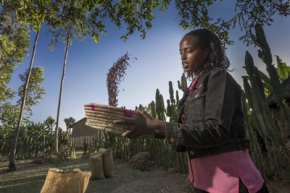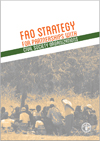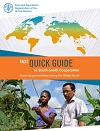The Food and Agriculture Organization of the United Nations (FAO) is convinced that hunger and malnutrition can be eradicated in our lifetime. To meet the Zero Hunger Challenge, political commitment and major alliances with key stakeholders are crucial. Partnerships are at the heart of FAO’s mission to help build consensus for a world without hunger. The effectiveness and credibility of the Organization as a policy-making forum and unique multilingual centre of excellence, knowledge and technical expertise depends to a considerable degree on its ability to work and develop strategic partnerships. Only through effective collaboration with governments, civil society, private sector, academia, research centres and cooperatives, and making use of each other’s knowledge and comparative advantages, can food insecurity be defeated.
- “I will not be able to do anything except what we can do together” José Graziano Da Silva, FAO Director General

- "Better is good, but when it comes to hunger, better is not good enough. There are 795 million reasons why" José Graziano Da Silva, FAO Director General

- “The world faces many challenges that we can only overcome if we work together” José Graziano Da Silva, FAO Director General

- “We cannot improve nutrition without food security. And we cannot achieve food security without better food systems” José Graziano Da Silva, FAO Director General

- “Family farming and small scale producers have a lot to offer — to their local communities, and on international markets. Their potential is large; they just need the right kind of support to unlock it” FAO-Eataly partnership

- "The signature of this agreement is a starting point to merge our interests in promoting best agricultural practices and technologies" José Graziano Da Silva, FAO Director General

- “Partnerships with Academia have strategic potential in the fight against hunger. Scientific knowledge is essential to increase agricultural productivity, but that knowledge frequently does not reach the small holders in a useful way. This partnership, will connect research to the real needs on the ground” Marcela Villareal, Director, Office for Partnerships, Advocacy and Capacity Development

- “I have always stressed that we need the private sector on board in this challenge to ensure that no one goes to bed hungry” José Graziano Da Silva, FAO Director General

- “Partnering with specialized agricultural media can play a critical role in informing the general public and target audiences that together, we can transform the lives of those who suffer from chronic hunger and food insecurity - and that it can be done in our lifetime” José Graziano Da Silva, FAO Director General

- “The private sector plays a crucial role in fostering responsible agricultural investments” José Graziano Da Silva, FAO Director General

Publications

FAO strategy for partnerships with the Private Sector
FAO Strategy for Partnerships with the Private Sectorhas been prepared in response to the comments of the Programme and Finance Committee, and is aligned with ongoing efforts for decentralization, the review of FAO’s Strategic Framework and the Organization-wide Strategy on Partnerships, within the context of the Director-General’s overall vision for transformational change of the Organization. [...]

FAO strategy for partnerships with Civil Society Organizations
FAO has been working for many years with hundreds of civil society organizations (NGOs, community-based organizations, professional associations, networks, etc.) in technical work, emergency field operations, training and capacity building, and advocacy of best agricultural practices. [...]

FAO's Quick Guide to South-South Cooperation
The Guide takes readers through a step by step process on how to engage in South-South Cooperation as a complementary instrument to North-South Cooperation, as a means to deliver on FAO’s mandate and achieving the Sustainable Development Goals. It also provides the tools required to raise the profile of countries engaged in South-South Cooperation, as well as encourage others that have something to offer [...]











